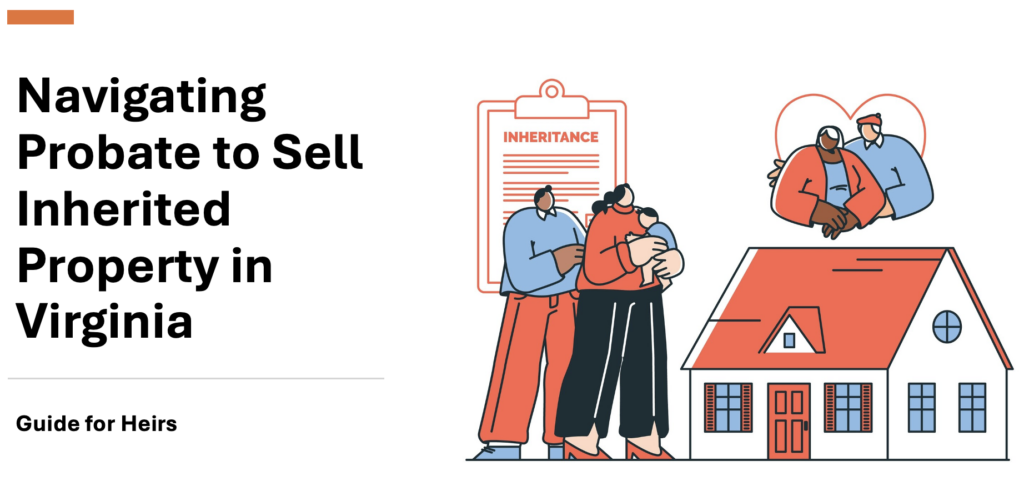nheriting a property can be an emotional and overwhelming experience, especially when multiple heirs are involved. Dealing with the legal and financial aspects of selling an inherited home while navigating family relationships can feel daunting. However, with the right approach and professional guidance, the process can be streamlined to ensure a fair and smooth sale.
If you’re facing the challenge of selling an inherited house in in Virginia with multiple heirs, this guide will walk you through the necessary steps and offer solutions to help avoid conflict, expedite the sale, and maximize the property’s value.
🚀 Want a step-by-step guide on navigating probate and selling an inherited home? Download Our Free Probate Guide Now!
The Emotional and Legal Challenges of Selling an Inherited Home
Selling an inherited house is rarely just about finances—it often involves deep emotional ties to a loved one who has passed away. Family members may have different perspectives on how to handle the property, which can lead to disagreements.
Additionally, legal complexities arise when multiple heirs must agree on how to proceed. Probate laws, estate taxes, and title transfers can complicate matters, making it essential to educate yourself on the process. By understanding your options and working with experienced professionals, you can move forward with confidence.
Get Your Free Probate Guide!
Download our comprehensive guide, “Navigating Probate to Sell Inherited Property” and gain:
✅ Step-by-step instructions
✅ Links to essential forms and resources
✅ Pro tips for a smooth property sale
✅ Clear timelines and next steps

Step 1: Establishing Open Communication Among Heirs
One of the most critical steps in selling an inherited property is ensuring that all heirs are on the same page. Open and honest communication can prevent misunderstandings and conflicts.
Tips for Effective Communication Among Heirs:
- Hold a Family Meeting: Gather all heirs to discuss expectations, concerns, and preferences regarding the sale.
- Set Common Goals: Decide on a fair approach that benefits everyone. Some heirs may want to sell quickly, while others may prefer holding onto the property.
- Use a Mediator if Necessary: If tensions arise, consider hiring a neutral third party to facilitate discussions and ensure fair decision-making.
A structured approach to communication ensures that the process remains smooth and avoids unnecessary delays.
📘 Confused about the stepped-up basis? Our probate guide explains it in simple terms. Grab your free copy today!
Step 2: Identifying the Executor and Their Role
The executor of the estate plays a crucial role in managing the property’s sale. This person is either designated in the will or appointed by the court. Their responsibilities include:
- Following the terms of the will and ensuring a fair distribution of assets.
- Coordinating with real estate professionals to determine the home’s value.
- Overseeing the probate process and ensuring all legal requirements are met.
In cases where multiple heirs are involved, an independent executor can help maintain impartiality and prevent disputes. If necessary, hiring an estate attorney can further ensure that the process remains fair and legally sound.
✅ Stay ahead of tax surprises! Download our comprehensive probate guide to learn how to reduce your tax liability. Get it now!
Step 3: Understanding Probate and Legal Requirements
Most inherited properties must go through probate before they can be sold. Probate is the legal process of validating a will and distributing the deceased’s assets. The timeline for probate varies depending on state laws and whether any disputes arise.
Key Steps in the Probate Process:
- Filing a Petition – The executor submits the will to probate court.
- Property Appraisal – The home’s fair market value is determined.
- Settling Debts & Taxes – Outstanding debts and estate taxes must be paid.
- Gaining Court Approval to Sell – In some cases, the court must approve the home’s sale.
- Distributing Proceeds – Once sold, proceeds are divided among heirs according to the will or state law.
📄 Want to make sure you report everything correctly? Our probate guide includes a tax reporting checklist. Download it free!
Step 4: Addressing Financial Considerations
Capital Gains Tax on Inherited Property
When selling an inherited home, capital gains tax may apply. However, heirs benefit from a step-up in basis, which adjusts the property’s value to its fair market value at the time of the previous owner’s death. This often reduces taxable gains.
For example:
- If your parent purchased a home for $100,000 but its market value was $300,000 at the time of their passing, your taxable gain is based on $300,000, not the original purchase price.
- If you sell for $310,000, your capital gains tax is only on the $10,000 difference.
Consulting with a tax professional can help you understand potential tax liabilities and strategies to minimize them.
📊 Not sure if estate taxes apply to you? Our free guide can clarify things. Download your copy today!
Step 5: Deciding on the Best Selling Strategy
Once legal and financial matters are in order, the next step is determining how to sell the property.
Option 1: Selling on the Open Market
A traditional sale can yield the highest price but may require repairs, staging, and time to find the right buyer. If the home is in good condition and there’s no urgency to sell, this may be a great option.
Option 2: Selling to a Direct Home Buyer
For heirs who want a fast, hassle-free sale, selling directly to a home-buying company like Virginia Cash Home Buyer can be an excellent solution. This eliminates the need for repairs, showings, and long closing timelines. A cash sale can be completed in days or weeks, allowing heirs to divide proceeds quickly and move forward.
🏡 Still weighing your options? Our probate guide helps you decide what’s best for you. Download it here!
Step 6: Handling Property Repairs and Liabilities
If the inherited home requires significant repairs, heirs must decide whether to invest in renovations or sell as-is. Key considerations include:
- Cost of Repairs: Does the estate have funds to cover necessary upgrades?
- Market Conditions: Will repairs increase the sale price enough to justify the expense?
- Legal Risks: Selling a home in disrepair through a traditional listing may involve disclosure obligations.
A professional home buyer can purchase the property as-is, assuming all risks and repairs. This is often the best choice for heirs who want to avoid out-of-pocket expenses.
💡 Make probate easier! Our guide walks you through the entire process with simple steps. Get your free probate guide now!
Final Thoughts: Make the Process Easier with Professional Help
Selling an inherited property with multiple heirs can be complex, but it doesn’t have to be overwhelming. By fostering open communication, understanding probate laws, and choosing the right selling strategy, you can navigate the process efficiently and fairly.
If you’re looking for a quick, straightforward sale, Virginia Cash Home Buyer specializes in helping families sell inherited properties without repairs, agent fees, or lengthy wait times. We offer fair cash offers and handle all the paperwork for a smooth closing.
📞 Need expert advice fast? Download our probate guide or contact us directly for personalized help. Grab the guide now!
Get Your Free Probate Guide!
Download our comprehensive guide, “Navigating Probate to Sell Inherited Property” and gain:
✅ Step-by-step instructions
✅ Links to essential forms and resources
✅ Pro tips for a smooth property sale
✅ Clear timelines and next steps

